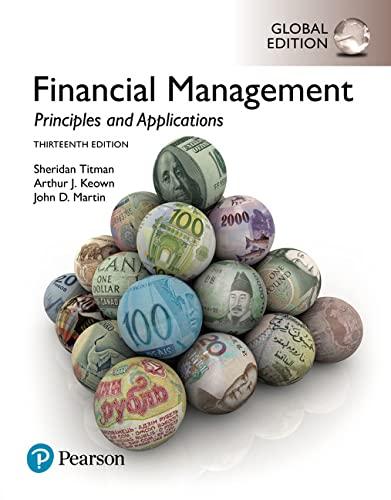please answer question 2 and show your work!
Problem #1 ABC Industries is considering expanding their facilities. As part of the decision process, ABC is calculating its weighted average cost of capital (WACC). Your assignment is to calculate the company's WACC based on the following information: Problem #2 Refer to the information concerning ABC Industries in problem #1. In discussions with the company's CEO, you learn that a decision has been made to eliminate future dividends on the company's common stock. This means that, since your estimate of the cost of common equity was based on the Discounted Cash Flow Method and a forecast of future dividend payments, your previous estimate of WACC is incorrect. 1. The firms' tax rate is 22%. 2. It will be necessary to recalculate the cost of common equity using the Capital Asset Pricing Model (CAPM). Research shows you the following: The current market price of ABC's outstanding bonds is 107% of their $1,000 par value. The bonds have an annual coupon rate of 6.4% and make coupon payments semiannually The bonds mature in 15 years. New bonds will have a flotation cost of $15 per bond. Risk free rate RE Expected market return E (Rx) 2.5% per year 4.75% per year (T-bill proxy) (S&P 500 proxy). 3. Further, the beta for the company is: BABC +1.45. 4. The current price of the firm's preferred stock is $86.00 per share. The stock has a $100 par value and a 4.4% annual dividend rate (paid annually). Flotation costs on new preferred stock are expected to be $2.00 per share. The current price of the firm's common stock is $76.50 per share. Its next (upcoming) semiannual dividend will be Di = $3.80 per share. Dividends are paid semiannually and are expected to grow at an annual rate of 5% into the foreseeable future. The flotation cost for newly-issued common stock is 8%. NOTE that $3.80 is the amount of the semiannual dividend. It does not need to be divided by two. A. Use the CAPM to estimate the company's cost of common equity. B. Recalculate the company's WACC using the new estimate of cost of common equity. NOTE: do not include the common equity flotation cost. 2020 Balance Sheet (thousands of dollars) cash accounts receivable inventory current assets gross fixed assets accum. depreciation net fixed assets total assets 95 335 369 799 6056 1000 5056 5855 accounts payable notes payable accruals current liabilities long-term debt (bonds) preferred stock common stock paid-in capital retained earnings total common equity total liabilities and equity 200 250 101 551 1501 425 100 705 2573 3378 5855 1 Problem #1 ABC Industries is considering expanding their facilities. As part of the decision process, ABC is calculating its weighted average cost of capital (WACC). Your assignment is to calculate the company's WACC based on the following information: Problem #2 Refer to the information concerning ABC Industries in problem #1. In discussions with the company's CEO, you learn that a decision has been made to eliminate future dividends on the company's common stock. This means that, since your estimate of the cost of common equity was based on the Discounted Cash Flow Method and a forecast of future dividend payments, your previous estimate of WACC is incorrect. 1. The firms' tax rate is 22%. 2. It will be necessary to recalculate the cost of common equity using the Capital Asset Pricing Model (CAPM). Research shows you the following: The current market price of ABC's outstanding bonds is 107% of their $1,000 par value. The bonds have an annual coupon rate of 6.4% and make coupon payments semiannually The bonds mature in 15 years. New bonds will have a flotation cost of $15 per bond. Risk free rate RE Expected market return E (Rx) 2.5% per year 4.75% per year (T-bill proxy) (S&P 500 proxy). 3. Further, the beta for the company is: BABC +1.45. 4. The current price of the firm's preferred stock is $86.00 per share. The stock has a $100 par value and a 4.4% annual dividend rate (paid annually). Flotation costs on new preferred stock are expected to be $2.00 per share. The current price of the firm's common stock is $76.50 per share. Its next (upcoming) semiannual dividend will be Di = $3.80 per share. Dividends are paid semiannually and are expected to grow at an annual rate of 5% into the foreseeable future. The flotation cost for newly-issued common stock is 8%. NOTE that $3.80 is the amount of the semiannual dividend. It does not need to be divided by two. A. Use the CAPM to estimate the company's cost of common equity. B. Recalculate the company's WACC using the new estimate of cost of common equity. NOTE: do not include the common equity flotation cost. 2020 Balance Sheet (thousands of dollars) cash accounts receivable inventory current assets gross fixed assets accum. depreciation net fixed assets total assets 95 335 369 799 6056 1000 5056 5855 accounts payable notes payable accruals current liabilities long-term debt (bonds) preferred stock common stock paid-in capital retained earnings total common equity total liabilities and equity 200 250 101 551 1501 425 100 705 2573 3378 5855 1







